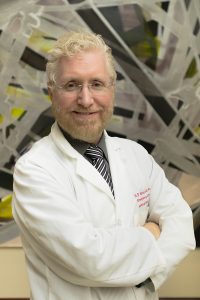Keck minor offers firsthand experience

Christopher Chou | Daily Trojan
The doctor is in · Sean Nordt, assistant dean of pre-health studies, heads the only health care studies minor program in the United States.
Sumeet Sidhu, a senior majoring in health and humanity, has learned a lot about wilderness survival. He knows how to build a shelter by scavenging his surroundings and has studied the effects of hypothermia firsthand by jumping into 50 degree waters off of Catalina Island.
But Sidhu is not a boy scout. He has taken MEDS 465: Wilderness and Survival Medicine, a course offered through Keck School of Medicine of USC’s health care studies minor program.
The health care studies minor is the first of its kind in the United States, as courses are taught by Keck faculty but at the undergraduate level. This provides undergraduate students interested in medicine with a direct link to a professional school, as well as access to teachers and mentors within the health sciences.
For Anna Catinis, a junior majoring in health and human sciences, the program has allowed her to access multiple volunteer and research opportunities.
“There’s this saying, ‘It’s not about the classes you take, it’s about the connections you make,’ and I think in a lot of cases that can be true,” Catinis said. “But this minor is a really wonderful exception in that the classes you take lead to the connections you make.”
Through the minor, Catinis has been able to access Keck faculty and work alongside principal investigators when conducting research. She has also shadowed physicians in the Emergency Room of the Children’s Hospital Los Angeles alongside medical students, which she said provided her with a more realistic view of her career path.
“Shadowing the medical students is really relatable since they were in your shoes just a couple years before,” Catinis said. “You get to see what you’ll be doing in the next step, rather than 10 years down the road.”
Catinis currently conducts clinical research at Children’s Hospital Los Angeles. The minor has also allowed Catinis to explore the medical field without taking classes she deemed unnecessary.
“I ended up changing my major so that I could double-minor and fit in all my classes, and cut out some of those upper-division science classes like genetics and microcell biology,” Catinis said. “I have never regretted it — it’s probably one of the best decisions I’ve made at USC so far.”
According to Sean Nordt, assistant dean of pre-health studies and the director of the minor in health care studies, the minor is open to students of all majors, and students are not required to declare the minor in order to take courses within the program.
“We’d love for anyone who wants to take the minor to do so, but we’re happy if someone just takes one course and dips their feet in it,” Nordt said. “The program is for anybody, not just for pre-med.”
Caroline Vance, a senior majoring in industrial and systems engineering, said the health care studies minor was crucial in allowing her to pursue a new career path without changing her major entirely.
“I was contemplating a career switch midway through college, and I ended up using the minor to get more introduction to health care and clinical medicine,” Vance said. “It completely revolutionized my future and changed the way I see the world.”
For Sidhu, the program’s largest appeal was its access to Keck faculty and a wide range of course offerings, such as MEDS 425: Medical Examiner-Coroner: Investigating Death.
“It’s taught by the chief coroner of Los Angeles county, who testified at O.J. Simpson’s trial and led the autopsy on Michael Jackson,” Sidhu said. “He told us his office was really busy a couple weeks ago, and we were all pretty sure he was talking about Carrie Fisher.”
The minor provided Vance with research opportunities and real-world hospital experience that allowed her to bridge the gap between the content she learns in class and what she plans to do in the future.
“It verifies that is what you want to do with your life,” she said. “You really get to see the light at the end of the tunnel — you’re working hard so that you can have these awesome clinical experiences, so it all seems worthwhile in the end.”
